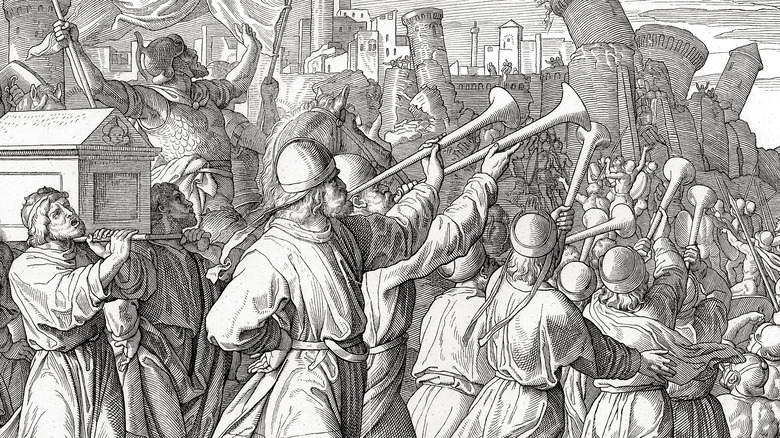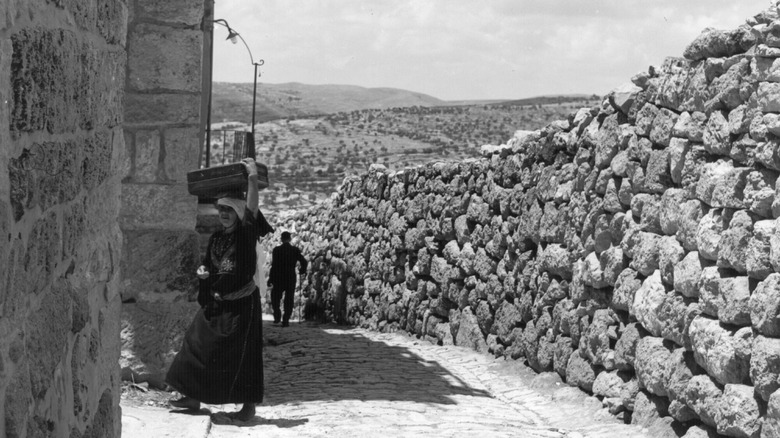The Theory That Counteracts Myths About The Wall Of Jericho
What actually happened to the wall of Jericho, and when? Contextualizing biblical narratives in light of archaeological findings is an ongoing challenge among scholars of Bronze Age prehistory, and there's no debate more emblematic of this tension than the juxtaposing theories about the battle of Jericho and its fall.
When did Jericho fall, and why? When the Bible says the walls of Jericho fell, did Jericho ... even exist? These are all questions hotly contested by scholars in what may seem a relatively petty arena of fact. However, among archaeologists, biblical historiographers, and scholars of military prehistory, it couldn't be more critical when it comes to determining the credence of timelines proposed by the book of Joshua (Via The New York Times).
Fact or fiction? There are two theories — and one myth.
In the book of Joshua chapter 6, we're told a tale like many others: God wanted the Israelites to conquer Canaan. Guarding Canaan from the east was Jericho, a fortress city, surrounded by "impregnable" walls. God told the Israelites to march around the walls of Jericho blowing trumpets and carrying the Ark of the Covenant. The Israelites, the story tells us, did so for six days, and on the seventh day the walls of Jericho collapsed and the fortress was set on fire. You may know the story. (There's even a "Veggie Tales" movie about it.)
So did trumpets bring down an ancient fortress of what was then a formidable nation? If not, what may have happened?
So why did the walls of Jericho fall? And...did they?
Scholars, perhaps predictably, say it's unlikely that parading around a fortress with instruments brought a powerful military fortress to its knees. The issue of trumpet-induced archaeological disaster isn't exactly a fault line among academics.
However, the explanation may involve an actual fault line. Some historians have raised the point that the city of Jericho was located in a low-sea-level area that was highly prone to earthquake activity (via Top Tenz). It's entirely plausible, they argue, that the walls of Jericho did collapse and a pastoral Israelite migration transpired that was embellished and mythologized over time to serve as an analogy of the Israelites' perseverance or good fortune (via National Geographic). If the walls of Jericho fell during a siege, the siege was mostly likely one by the Egyptians, some scholars say.
However, competing theories abound. Until the 1990s, the prevailing theory was that the biblical account of the Battle of Jericho couldn't have possibly happened— considering archaeological findings date Bronze Age Jericho's fall to 150 years prior to the Israelites' presence. However, findings in the 1990s by Dr. Bryant G. Wood, a University of Toronto archaeologist, offered a countering explanation that may indicate the biblical and archaeological timelines could be in sync. A fairly intensive study involving seismic activity in the region, carbon-14 dating, and ceramic remnants makes the case that the walls of Jericho may have fallen around the time of the Israelite invasion of Canaan (via The New York Times).
Who's right?
When it comes to reconciling ancient mythological accounts and archaeological evidence, there's always interpretation involved, especially when these two tell differing stories of history. Archaeology, too, is an evolving discipline with discoveries that continue to be made, often transforming earlier findings. Yet the role of the Bible is scarcely regarded in academia as one of concrete historical narrative, and, while it bears significance, the weight of interpreting each sphere in context of the other is an ongoing matter of academic debate. Even after the 1990s, this debate about Jericho carries on. And some elements, logic dictates, will forever fall in the sphere of individual hypotheses.
So what really happened? We'll never know, and assembling the clues left to us by our predecessors is a painstakingly complicated game. However, this controversy leaves us with an important lesson: while the events of history are certainly fixed, our understanding of them is constantly evolving. The debate carries on, and, as always, we continue to strive to understand prehistory.


